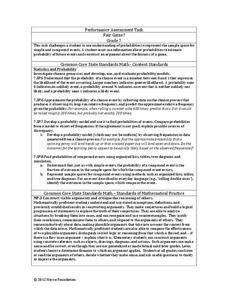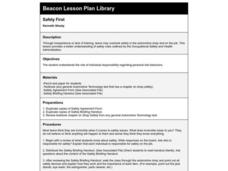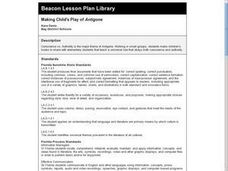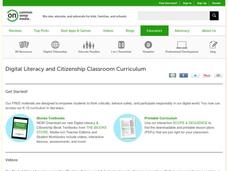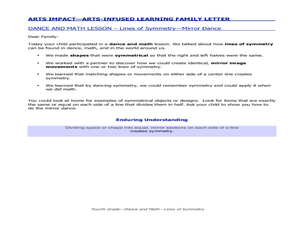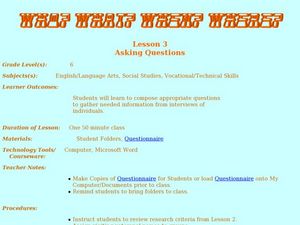Curated OER
Whose Is It? (Pronouns and Antecedents)
Define and explore pronouns and antecedents. Young writers read and complete a worksheet using pronouns and correct antecedents. The worksheet is not included but can be easily found online and then dispersed as homework (insert evil...
Core Knowledge Foundation
Third Grade Skills Unit 3: How Does Your Body Work?
A skills unit combines ELA and science with lessons that explore the human body. Lessons begin with a reading, go into skills practice, and offer take-home materials. Skills practice includes listening to and discussing a read-aloud,...
Curated OER
Mayflower Compact
Students explore the Pilgrims and the Mayflower Compact. They practice these concepts by examining the school rules.
Curated OER
Express Yourself Lesson Seed 7: Pronouns
Take a break from literature study to address some grammatical concerns. Using a text you've already read in your class, show how to analyze pronoun use. After watching the master, pairs analyze a short excerpt on their own, identifying...
Noyce Foundation
Fair Game?
The game should be fair at all costs. The mini-assessment revolves around the ability to use probabilities to determine whether a game is fair. Individuals determine compound events to calculate simple probabilities and make long-run...
Curated OER
Living to Eat, Eating to Live
Students develop a five paragraph essay.They write their essays, review rules related to subject/verb agreement and the use of transition words or devices. They find examples of transition words or devices in newspaper or magazine...
Curated OER
Regular And Irregular Plurals
Sixth graders engage in a lesson that covers the use of regular and irregular plurals. They practice using four different games which work for keeping the student level of engagement high. Students review the rules of basic plurals and...
Curated OER
Safety First
Fourth graders engage in a lesson which provides a better understanding of safety rules outlined by the Occupational Safety and Health Administration. They submit a written report from the Safety Briefing Handout which summarizes the key...
Curated OER
Islam or Christianity?
Students design a mosaic depicting the city of Constantinople during determined periods of history. They include historical evidence that shows whether the city was under Muslim or Christian rule.
Curated OER
Making a Child's Play of "Antigone"
Fourth graders make studenT books to share with elementary students that teach a universal rule that obeys both conscience and authority.
Curated OER
The Arrival
Students construct classroom rules. In this philanthropy lesson, students investigate The Mayflower Compact made by the Pilgrims and use it as a guide to form their own classroom rules. Students work in small groups.
Curated OER
Picnic Safety
Students plan a picnic menu using the food safety rules. They pack a cooler with different types of cold packs and also pack a basket with food that does not have to be kept cold.
Curated OER
What Your Signature Means to You and Others
Students discuss significance and value of writing their signatures on various documents, recall times they have signed their names, and demonstrate understanding that signatures are important representations of people, and symbols of...
Curated OER
Making Decisions by Group: The Jury System
Students discover how to work cooperatively within a group and communicate their ideas clearly in order to reach an agreement. They summarize their experience in writing and hand down a verdict of guilt or innocence based on the...
Curated OER
A Little Fun with Adjectives
Students examine the rules for the use and formation of adjectives and play a game of tic-tac-toe to determine the correct form of the word to be used.
Curated OER
Long "u" With Silent "e" Printing Practice Worksheet
In this long "u" with a silent "e" printing practice activity, student trace 8 words, read them, and match them to black line pictures. They print words such as flute, rule, and tune.
Curated OER
Good E-mail Manners
Students discuss online e-mail safety and etiquette rules and how they should apply the same rules in cyberspace as they use when encountering strangers in the face-to-face world. They participate in mock situations and tell what the...
Curated OER
Transmission of Disease
Students provide names of viral diseases that they would possibly like to be infected with today; listing them on the Smart Board. They then come to an agreement about what virus to use and use beakers of fluids to simulate how viruses...
Curated OER
Lines of Symmetry - Mirror Dance
Fifth graders analyze how to divide space or shape into mirror sections to create lines of symmetry. In this lines of symmetry lesson, 5th graders discuss symmetry in dance, math, and living. Students participate in a dance warm-up and...
iCivics
Mock Election
Here is an excellent resource in which class members host a mock election for a candidate and policy that will be implemented into your very own classroom. Progressing from primaries, through the campaign trail, and finally to the mock...
Curated OER
Who? What? When? Where? Asking Questions
Sixth graders interview Veterans or role play to answer who, what, where, when questions. In this Veteran's Day questioning activity, 6th graders learn about the events in the military service of veterans. Students may simulate...
Oakwood Publishing
Workshop 4: Constitutional Convention
How do new amendments become part of the US Constitution? AP government students explore, analyze, and use the US Constitution to develop a deep understanding of the interworkings of law and government while practicing synthesis and...
New South Wales of Education and Communities
Setting the Scene
How to establish a safe classroom environment for discussion is the focus of this introduction to a series of six resources devoted to personal safety.
Curated OER
Why Do Governments Exist? Locke, Hobbes, Montesquieu, and Rousseau
Here is a great secondary source reading that includes the primary ideas and philosophies of the famed Enlightenment philosophers: Thomas Hobbes, John Locke, Charles Montesquieu, and Jean-Jacques Rousseau. In additional to discussing...






